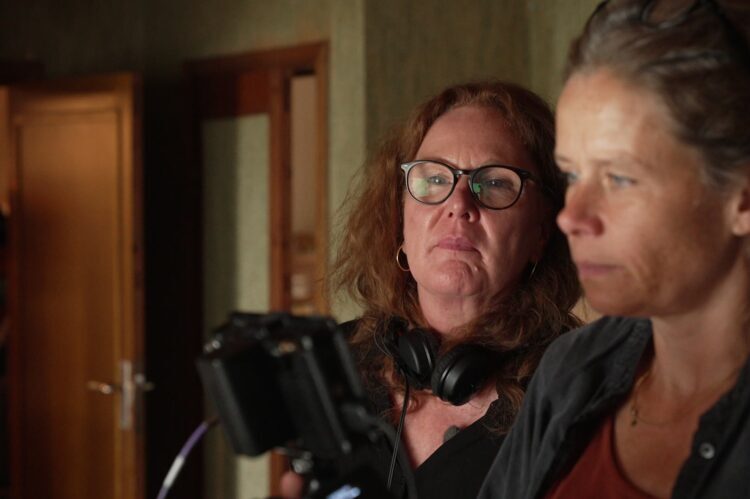Intimacy coordination in TV / film
Grounded in a deep understanding of the actor’s process, my approach combines storytelling, choreography, and acting techniques with a consent-based and trauma-informed perspective. This allows us to craft authentic, meaningful scenes that deepen character relationships and enrich the narrative. By encouraging a safe and inclusive environment, I support actors to perform with confidence and creativity, making intimate scenes feel dynamic, nuanced, and compelling—for both performers and the story.
As a specialized professional, the intimacy coordinator serves as Head of Department (HOD) for intimacy (IC department), overseeing all intimate- and hyper exposed scenes in a production. In this role, I work at the intersection of creativity and safety, working closely with directors, actors, and the production team to create a trusting environment where performers can explore their scenes and characters fully.

Photo: Young Royals S3 – Johan Paulin / Netflix
Guidance for working with an intimacy coordinator
Like other high-risk elements, intimate and highly exposed scenes require careful preparation and planning. Building time into both pre-production and the shooting schedule allows these scenes to be approached safely, creatively, and efficiently.
In addition to pre-production meetings and rehearsals, time should be allocated on the shooting day to review the scene and its choreography, ensure consent, make necessary adjustments, allow for the application of modesty garments, and conduct post-scene debriefings. This extra planning usually results in smoother and more efficient shooting.
Scenes with additional complexity—such as those involving minors, large groups, public spaces, prosthetics, body doubles, or stunts—may require extra coordination time or specific resources.
The intimacy coordinator works closely with production to anticipate these needs early, helping to integrate them into the schedule and budget from the outset. This collaborative planning ensures that safety and artistic integrity are maintained throughout the process and that each scene is approached according to its specific requirements.
Whether a scene is defined as intimate or highly exposed depends on an assessment of content, context, and the scene’s intention. Certain scenes, such as simulated sex, nudity, or scenes with strong sexual content, are always classified as intimate. Other scenes may be perceived as intimate depending on the context, the participants, and their experiences. This shared assessment forms the basis for planning the scene.
Examples of different types of scenes, with or without sexual content, and highly exposed scenes:
Scenes with sexual content: e.g. simulated sex, kissing, masturbation, striptease, sexual dance, nudity, etc.
Scenes without sexual content: e.g. intimate touch, lightly dressed, gynecological examination, childbirth, nudity, etc.
Highly exposed scenes: e.g. intense emotionally charged situations such as death, murder, suicide, panic attacks, trauma.
Scenes involving minors, body doubles, or stunts often require more planning and resources. In larger crowd scenes, it may be necessary to assign additional IC assistants to ensure both safety and artistic quality are maintained.
The intimacy coordinator ensures that intimate and highly exposed scenes are handled professionally throughout the production process. This includes everything from script breakdown and risk assessment to planning, shooting, and post-production, as well as routines for closed or sensitive sets. Through this, a structured workflow is created that prioritizes both safety and artistic expression. When needed, the intimacy coordinator also participates in casting and ADR.
An intimacy coordinator works from the perspectives of safety, artistic expression, and storytelling. The role follows international standards and is validated through specialized training and certification or accreditation.
Certified Intimacy Coordinator has completed training at a recognized institution (e.g., NIC, IPA, IDC) and is trained in protocols, risk assessment, choreography, and consent-based work.
Accredited Intimacy Coordinator in addition to training, has had their professional competence and experience reviewed and approved by a professional organization (e.g. SAG-AFTRA).
In addition to being an accredited intimacy coordinator, Malin is also trained as a Mental Health First Aider (MHFA England) and holds certification for working with minors and children on film sets (City & Guilds Accredited PART, UK)
The intimacy coordinator serves as Head of Department for the intimacy department (IC department) and is responsible for work on intimate and highly exposed scenes. The role involves leading, coordinating, choreographing, assessing risks, documenting, and following protocols to ensure safety and artistic quality throughout the process. The intimacy coordinator has expert knowledge in managing physical and emotional intimacy, as well as highly exposed scenes, and is involved in all decisions and changes related to these scenes.
The IC department typically consists of one intimacy coordinator, but for larger projects or more complex scenes, the team can be expanded with IC assistants or other specialized personnel.
Like other department heads, the intimacy coordinator collaborates closely across production departments and maintains close dialogue with the producer, production manager, first AD, director, actors, costume, makeup, set design, cinematography, locations, and post-production etc.
Lead Intimacy Coordinator
Heads the IC department, overseeing all intimate scenes and managing any additional Intimacy Coordinators. Responsibilities include scene breakdowns, documentation, coordination with departments, risk assessments, and arranging extra Intimacy Coordinators if needed. If no additional Intimacy Coordinator is involved, the Lead is credited simply as “Intimacy Coordinator.”
Intimacy Coordinator (Additional / Extra / Cover)
Supports the Lead or steps in when multiple Intimacy Coordinators are needed for a scene.
Assistant Intimacy Coordinator
Provides extra support with fewer responsibilities.
Intimacy Consultant
Advises productions in advance or provides guidance when no on-set support is required. Cannot replace an on-set Intimacy Coordinator for sensitive scenes. In unscripted projects, may offer training or check-ins. Credited as Intimacy Consultant unless otherwise agreed.
Intimacy Coach
This is not an official title and should not be used for Intimacy Coordinators.
Frequently Asked Questions (FAQ)
Is an intimacy coordinator needed even for 'just a kiss'?
What happens if an actor changes their mind?
Is the intimacy coordinator only there for the actors?
Does having an intimacy coordinator limit the scenes?
We're i early pre-production and not sure if there's a need for intimacy coordination – what should we do?
We don’t have a budget for all intimate scenes—can we still do them?
Is an intimacy coordinator needed even for 'just a kiss'?
Not always. A non-sexual kiss between adult actors can often be managed by the director and performers if everyone feels comfortable. However, factors such as age, experience, and the emotional tone of the scene should be taken into consideration. Some directors still choose to have an intimacy coordinator present to support the artistic expression.
What happens if an actor changes their mind?
Answer: Actor’s consent is always central. If someone changes their mind, the intimacy coordinator can halt the scene and help the production find a safe and respectful solution. The scene can be adjusted or modified so that everyone feels comfortable without compromising the story.
Is the intimacy coordinator only there for the actors?
Answer: No. The intimacy coordinator supports both the actors and the production team. Through structure, choreography, and guidelines, the intimacy coordinator helps the team plan, film, and stage intimacy in a way that is both safe and artistically enriching.
Does having an intimacy coordinator limit the scenes?
Answer: Absolutely not! The intimacy coordinator work is not about limiting storytelling but about giving intimate scenes the same space and weight as other scenes. By creating safety and clear boundaries, actors are able to fully engage with their creative process, exploring choices and nuances in their work, often resulting in richer, more vivid, and believable scenes..
We're i early pre-production and not sure if there's a need for intimacy coordination – what should we do?
Answer: That’s completely understandable. At this point, when you’re starting to bring people on board, it’s a great time to check in. A consultation is always possible. Malin can read through the script and break down the scenes to assess whether intimacy coordination is needed. Sometimes a short conversation is all it takes to clarify things and make sure everyone feels safe and supported from the start.
We don’t have a budget for all intimate scenes—can we still do them?
Answer: Yes and no. If a scene is not budgeted for an intimacy coordinator, it can sometimes be done, but in a modified form. The intimacy coordinator can guide the production in adjusting the scene so it is no longer considered intimate while preserving the story. For example, a shower scene focusing only on the actor’s face, with the actor wearing clothes, can be filmed without being classified as an intimate scene; however, if any nudity is visible, it would fall under that category.
The industry meeting on intimacy coordination.
In March 2022 the Joint Council within Film and TV (Film and TV Producers, SF Studios, the Swedish Film Institute, and the Union for Performing Arts and Film – Scen & Film) held a landmark meeting for the Swedish film and TV industry. The focus was on approaching intimate scenes more professionally and creating a safer, more inclusive work environment while enhancing production quality.
I was invited to speak alongside director Goran Kapetanović and actor Aliette Opheim about our collaboration on the TV series Knutby season 1 (starts at 40:50). Other participants included chair of Bectu’s Intimacy Coordinators Branch Yarit Dor, chair of the drama section of the Film and TV Producers Jan Blomgren, and HR and communications manager at SF Studios Kristina Linglöf. The event was moderated by Simon Norrthon, chair of the Union for Performing Arts and Film – Scen & Film
Follow along on set!
In October 2024, Fredrik Önnevall from the cultural program Sverige! (SVT) followed me in my work: In this feature, you’ll get a brief insight into my practice during rehearsals and on set while working on the second season of the youth series Bara Sex, alongside actors Alexander Klum and Simon Abrahamsson.
It highlights how, by focusing on storytelling, movement, and choreography, a safe and respectful environment can be created for everyone involved—and that you can actually have a bit of fun along the way.
Click here to watch the program (external link). The segment starts 3:30 into the program and continues until 10:50. In Swedish.
Astronomy Binoculars A Great Alternative
Lorem Ipsum is simply dummy text of the printing and typesetting industry. Lorem Ipsum has been the industry’s standard dummy text ever since the 1500s, when an unknown printer took a galley of type and scrambled it to
There are many variations of passages of Lorem Ipsum available, but the majority have suffered alteration in some form, by injected humour, or randomised words which don’t look even slightly believable. If you are going to use a passage of Lorem Ipsum, you need to be sure there isn’t anything embarrassing hidden in the middle of text. All the Lorem Ipsum generators on the Internet tend to repeat predefined chunks as necessary, making this the first true generator on the Internet. It uses a dictionary of over 200 Latin words, combined with a handful of model sentence structures, to generate Lorem Ipsum which looks reasonable. The generated Lorem Ipsum is therefore always free from repetition, injected
It is a long established fact that a reader will be distracted by the readable content of a page when looking at its layout. The point of using Lorem Ipsum is that it has a more-or-less normal distribution of letters, as opposed to using ‘Content here
